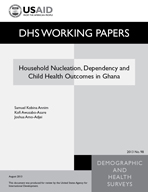
Abstract:
The Millennium Development Goals have
increased international attention to child
malnutrition in the developing world. Goal 1
aims to reduce hunger, and Goal 4 aims to
reduce under-five child mortality. The study
uses three key anthropometric measures of
nutritional status among children—stunting
(low height for age), wasting (low weight for
height), and underweight (low weight for age)
—to explore the dual effects of household
composition and dependency on nutritional
outcomes of children under age 5. The
objectives are to examine changes in
household living arrangements of under-five
children and to explore the interaction of
dependency and nucleation on child health
outcomes.
The concept of nucleation, which is at the
core of this paper, refers to the changing
structure and composition of household living
arrangements, from highly extended with its
associated socioeconomic system of production
and reproduction, social behavior and values,
toward single-family households—especially
the nuclear family, containing a husband and
wife and their children alone. A negative
relationship between levels of dependency, as
measured by the number of children in the
household, and child health outcomes is
premised on the grounds that high dependency
depletes resources, both tangible and
intangible, to the disadvantage of young
children.
Data for the study were drawn from the last
four rounds of the Ghana Demographic and
Health Surveys (GDHS), from 1993 to 2008, for
the first objective—to explore changes in
household composition. For the second
objective, to explore how dependency affects
health outcomes of children under age 5, in
the context of household composition, the
study used data
from the 2008 GDHS.
The results show that, over time, households
in Ghana have been changing toward
nucleation. The main finding is that in
households with the same number of dependent
children, in nucleated households children
under age 5 have better health outcomes
compared with children under age 5 in non-
nucleated households. The results also
indicate that the effect of
dependency on child health outcomes is
mediated by household nucleation and wealth
status and that, as such, high levels of
dependency do not necessarily translate into
negative health outcomes for children under
age 5, based on anthropometric measures.
 Household Nucleation, Dependency and Child Health Outcomes in Ghana (PDF, 619K)
Household Nucleation, Dependency and Child Health Outcomes in Ghana (PDF, 619K)
